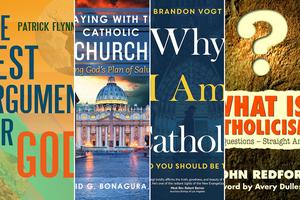Hope & Wonder: Finding God in Silence and Seeing With the Heart
An excerpt from The Plans God Has for You: Hopeful Lessons for Young Women.


And remember Samuel: God called to him during the night, and poor, tired Samuel thought it was Eli (see 1 Samuel 3). Eli knew it was God who was calling, so he told Samuel to reply, “Speak, for your servant is listening.”
That’s what we need to do: Be open to God’s call and listen — and then respond. I especially like Eli’s response to God’s call in Samuel’s life: “It is the Lord; let him do what seems good to him” (1 Samuel 3:18).
God is the creator of goodness, so He will direct us best. It all takes us back to Jeremiah 29:11, doesn’t it?
It’s important to remember that God often speaks quietly. Think of Elijah looking for God on the mountain. God wasn’t in the wind, earthquake or fire. God was in the silence (1 Kings 19:9-13).
Have you ever taken the time to be really silent? Quiet helps us listen to God and hear what He wants to tell us. So listening is key, whether God is speaking directly to us through Scripture or a faith-filled experience, or through a whisper in our hearts.
Seeing with the heart is the theme of one of my favorite stories, the beloved French classic The Little Prince by Antoine de Saint-Exupéry.
“And now, here is my secret, a very simple secret: It is only with the heart that one can see rightly; what is essential is invisible to the eye,” the wise fox tells the Little Prince. The fox’s statement should be taken seriously by all of us. If we all would judge with our hearts instead of with our eyes, our world could be a more just place.
Children always look with their hearts; they see with innocent minds because they have not been jaded by the ways of the world. Their experiences have taught them to see hope and wonder in everything. With Christ by your side, you can, too.
The fast-paced world we live in leaves little room to sit back and savor the beauty around us. Modern technology urges us to do everything faster, as if that makes everything better. But I don’t think anyone has time to ponder the meaning of life when they are constantly busy or text-messaging everyone they know 24/7.
Taking time to slow down allows us to recognize where the important moments occur, where the meaning of life happens. We need to make time to appreciate a beautiful sunset, enjoy a mug of hot chocolate or coffee, read a favorite book or magazine and be present to family and friends. In savoring the goodness of life, we gain a new perspective on the life we have. We can see the blessings around us, which is essential to understanding God’s past work in our lives so that we can be ready to move forward in trust, confident that we are doing His will. Appreciating life is vital to living fully, loving others, and being the best person God created you to be.
Knowing your priorities is key to discernment, too. When your priorities are straight, you can be more attuned to where God is calling you to next. How do we know when our priorities are straight? God should always be first — then family. After that should be school, work, etc., as well as friends and activities. As St. John Vianney said, “Here is a rule for everyday life: Do not do anything which you cannot offer to God.”
Amy Smith, the Register’s
associate editor, is the author of
The Plans God Has for You: Hopeful Lessons for Young Women
(Emmaus Road Publishing, 2020), from which this
excerpt was reprinted.
- Keywords:
- books
- discernment
- hope
- jeremiah 29:11
- the little prince
- wonder


















